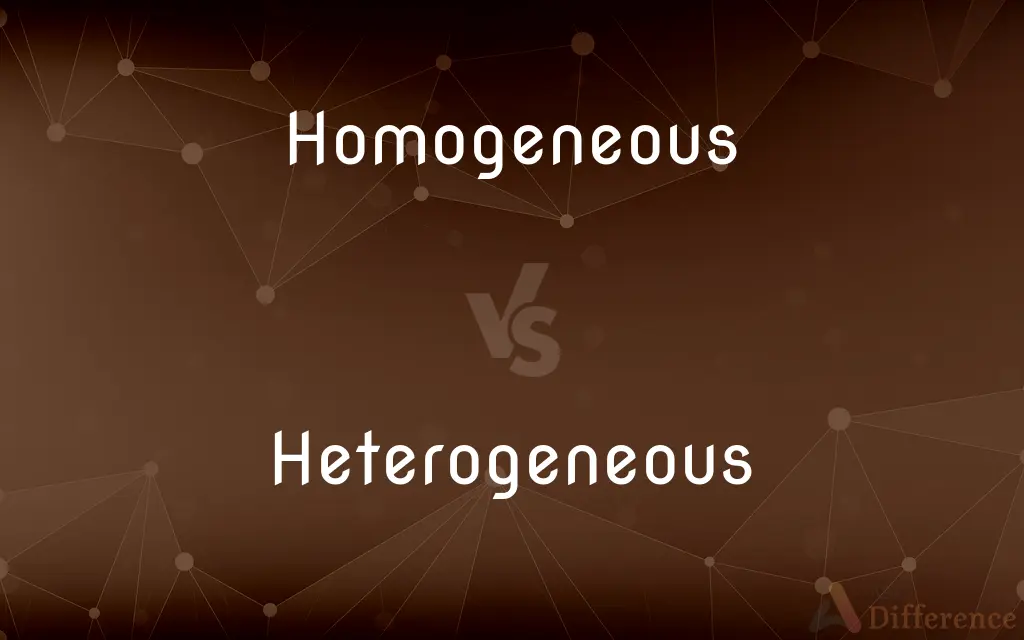Homogeneous vs. Heterogeneous — What's the Difference?
By Tayyaba Rehman — Published on October 6, 2023
Homogeneous refers to elements or components that are uniform or of the same kind; heterogeneous denotes a mix of diverse or dissimilar elements.

Difference Between Homogeneous and Heterogeneous
Table of Contents
ADVERTISEMENT
Key Differences
The terms "Homogeneous" and "Heterogeneous" are used to describe the uniformity or diversity within a group, mixture, or set. "Homogeneous" implies that the elements, components, or individuals within a group are similar or of the same kind, exhibiting uniformity in their characteristics or properties. "Heterogeneous," conversely, denotes a composition of diverse or dissimilar elements, highlighting the variance or disparity within the group.
In scientific contexts, especially in chemistry, a "homogeneous" mixture is one where the components are uniformly distributed, and it appears as a single phase, such as a solution of salt in water. A "heterogeneous" mixture, on the other hand, consists of visibly different substances or phases, like oil and water, which do not mix uniformly.
When discussing populations or groups of individuals, "homogeneous" refers to groups where the members share similar characteristics, backgrounds, or traits. In contrast, "heterogeneous" describes groups composed of individuals with varied characteristics, backgrounds, or traits, reflecting diversity within the population.
In the realm of mathematics, "homogeneous" equations or functions are those that exhibit symmetry or proportionality, with terms of the same degree. Conversely, "heterogeneous" equations or functions consist of terms of different degrees, exhibiting asymmetry or disproportionality.
Within systems or environments, "homogeneous" denotes uniformity in composition, structure, or properties, like a homogeneous material with consistent characteristics throughout. "Heterogeneous," however, implies diversity in composition, structure, or properties, indicating the presence of distinct components or regions within the system or environment.
ADVERTISEMENT
Comparison Chart
Meaning
Uniform or of the same kind.
Mix of diverse or dissimilar elements.
In Mixtures
Components are uniformly distributed.
Consists of visibly different substances or phases.
In Populations
Members share similar characteristics.
Composed of individuals with varied characteristics.
In Mathematics
Equations or functions exhibit symmetry or proportionality.
Equations or functions exhibit asymmetry or disproportionality.
In Systems
Denotes uniformity in composition, structure, or properties.
Implies diversity in composition, structure, or properties.
Compare with Definitions
Homogeneous
Pertaining to a sequence or function that maintains proportionality.
In mathematics, a homogeneous polynomial has terms of the same degree.
Heterogeneous
Consisting of diverse or dissimilar elements or components.
The rock was heterogeneous, composed of several minerals.
Homogeneous
Exhibiting uniformity or identical characteristics.
The classroom had a homogeneous distribution of students from various backgrounds.
Heterogeneous
Exhibiting variety in characteristics, qualities, or traits.
The workforce was heterogeneous, representing multiple backgrounds and skillsets.
Homogeneous
Describing a group or population sharing similar traits or backgrounds.
The community was quite homogeneous with shared values and beliefs.
Heterogeneous
Referring to systems or environments with varied composition or properties.
The terrain was heterogeneous, with plains, mountains, and valleys.
Homogeneous
Refers to a mixture where the components are uniformly distributed.
The solution became homogeneous after stirring.
Heterogeneous
Pertaining to a mixture with visibly different substances or phases.
The salad is a heterogeneous mixture of vegetables and dressing.
Homogeneous
Of the same kind; alike
If all jobs and workers were homogeneous
Heterogeneous
Describing a group or population with varied traits or backgrounds.
The city’s heterogeneous population contributed to its rich cultural tapestry.
Homogeneous
Denoting a process involving substances in the same phase (solid, liquid, or gaseous)
Homogeneous catalysis
Heterogeneous
Diverse in character or content
A large and heterogeneous collection
Homogeneous
Consisting of parts that are the same; uniform in structure or composition
"a tight-knit, homogeneous society" (James Fallows).
Heterogeneous
Also het·er·og·e·nous (hĕt′ə-rŏjə-nəs) Consisting of dissimilar elements or parts; not homogeneous.
Homogeneous
Of the same or similar nature or kind
"Professional archivists ... developed more or less homogeneous conservation practices" (David Howard).
Heterogeneous
Xenogeneic.
Homogeneous
(Mathematics) Consisting of terms of the same degree or elements of the same dimension.
Heterogeneous
Diverse in kind or nature; composed of diverse parts.
Homogeneous
Of the same kind; alike, similar.
Heterogeneous
(mathematics) Incommensurable because of different kinds.
Homogeneous
Having the same composition throughout; of uniform make-up.
Heterogeneous
Having more than one phase (solid, liquid, gas) present in a system or process.
Homogeneous
(chemistry) In the same state of matter.
Heterogeneous
(chemistry) Visibly consisting of different components.
Homogeneous
(mathematics) Of which the properties of a smaller set apply to the whole; scalable.
The function is homogeneous of degree 2 because .
Heterogeneous
(computing) Of a network comprising different types of computers, potentially with vastly differing memory sizes, processing power and even basic underlying architecture; alternatively, of a data resource with multiple types of formats.
Homogeneous
Of the same kind of nature; consisting of similar parts, or of elements of the like nature; - opposed to heterogeneous; as, homogeneous particles, elements, or principles; homogeneous bodies.
Heterogeneous
Differing in kind; having unlike qualities; possessed of different characteristics; dissimilar; - opposed to homogeneous, and said of two or more connected objects, or of a conglomerate mass, considered in respect to the parts of which it is made up.
Homogeneous
Possessing the same number of factors of a given kind; as, a homogeneous polynomial.
Heterogeneous
Consisting of elements that are not of the same kind or nature;
The population of the United States is vast and heterogeneous
Homogeneous
All of the same or similar kind or nature;
A close-knit homogeneous group
Heterogeneous
Originating outside the body
Homogeneous
Composed of parts or elements that are all of the same kind.
The milk is homogeneous after being homogenized.
Common Curiosities
How can Heterogeneous be used in a sentence?
"The classroom was a heterogeneous mix of students from different cultures."
What does Homogeneous mean?
Homogeneous refers to elements or components that are uniform or of the same kind.
Can Heterogeneous describe varied characteristics in groups?
Absolutely, heterogeneous describes groups composed of individuals with varied characteristics or traits.
Does a Heterogeneous mixture have visibly different substances?
Yes, a heterogeneous mixture consists of visibly different substances or phases.
What does Homogeneous imply in mathematical terms?
In mathematics, homogeneous implies equations or functions that exhibit symmetry or proportionality, with terms of the same degree.
Can you provide an example of Homogeneous in a sentence?
"The homogeneous solution was clear and uniform."
What does Heterogeneous denote?
Heterogeneous denotes a composition of diverse or dissimilar elements or components.
Is a Homogeneous mixture uniformly distributed?
Yes, in a homogeneous mixture, the components are uniformly distributed.
What does Heterogeneous imply in mathematical terms?
Heterogeneous implies equations or functions consisting of terms of different degrees, exhibiting asymmetry or disproportionality.
Can Homogeneous refer to populations?
Yes, homogeneous can describe populations where members share similar characteristics or traits.
Can Homogeneous denote uniformity in systems or environments?
Yes, homogeneous can denote uniformity in composition, structure, or properties within systems or environments.
Share Your Discovery

Previous Comparison
Common Stock vs. Treasury Stock
Next Comparison
Fundamental Niche vs. Realized NicheAuthor Spotlight
Written by
Tayyaba RehmanTayyaba Rehman is a distinguished writer, currently serving as a primary contributor to askdifference.com. As a researcher in semantics and etymology, Tayyaba's passion for the complexity of languages and their distinctions has found a perfect home on the platform. Tayyaba delves into the intricacies of language, distinguishing between commonly confused words and phrases, thereby providing clarity for readers worldwide.











































